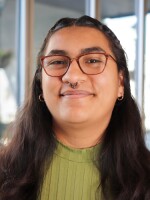Lake Effect On-Site returns with a live show at UW-Milwaukee's campus to celebrate 60 years of WUWM. In front of a live audience, Lake Effect’s Joy Powers and Audrey Nowakowski explore the origins of public radio, the evolution of WUWM — from its start as a student-run station to the community resource we know today — and the history of one WUWM’s cornerstone programs, the Eric Von Broadcast Fellowship.

For a look at how public radio got its start, Powers and Nowakowski are joined by Jack Mitchell, the first employee of National Public Radio, NPR. During his storied career in the world of public radio, he was also the first producer of All Things Considered, the director of Wisconsin Public Radio, the board chair of NPR and the author of Listener Supported: The Culture and History of Public Radio.
“I’m dating myself, but in the 1940s and 50s, radio was on all the time in our house, and I loved it and wanted to do it,” he says. “And then when I realized there was this thing called public radio coming onto the scene, I said, ‘Well, with this I can not play on the radio but do something that’s intelligent and meaningful and journalistically sound.”
Following the passage of the 1967 Public Broadcasting Act, Mitchell says it took three years to get National Public Radio off the ground. Although he describes NPR’s early days as “amateur,” he looks back fondly on how the team made the most of limited resources. A skeleton crew of just five producers and five reporters produced the original, 90-minute, daily broadcast of All Things Considered, he recalls.
“We had a couple of very talented people,” he says. “Susan Sandberg has to be mentioned because she was not only great on the air, but she was just a dynamo as a human being and understood in her gut what [public radio] ought to be.”

On Sept. 28, 1964, WUWM went on air for the very first time. The station began as a service with UW-Milwaukee's Instructional Communications Center, with the goal to provide Mass Communications majors and other students practical training in broadcast journalism.
At the time, WUWM was run primarily by volunteer students and Dr. Ruane Hill, the director of the ICC. Under Hill and the student program director Joanne Zutz’s guidance, a team of students wrote, produced and directed 76% of the shows on air. The programming ranged from news and music, correspondence courses, and foreign language cultural programs.
In July of 1970, WUWM was designated as a charter affiliate member station forming the new Public Radio Network. By 1976 it had become a full-scale radio station, providing public affairs and information to the entire Milwaukee community.
Dave Edwards started working at WUWM in early 1977 when he became the program news director. He was later named general manager in 1985 and led the station for more than four decades.
“The university at some point began to realize that NPR was growing and was becoming successful nationwide," he says. "And the decision was made that if UW-Milwaukee wanted to be an NPR station, it would have to move away from being totally dependent on students."

Eric Von was a journalist and commentator who worked in radio for more than 25 years in Milwaukee. His work engaged our community in conversations about the issues that matter to Milwaukeeans.
Von worked with WNOV and other commercial stations, and he spent his last years working with WUWM and 371 Productions on the Precious Lives Project — a two-year, 100-part weekly radio series about gun violence and young people in the Milwaukee area. He passed away in 2016 at the age of 58.
A year later, WUWM established the Eric Von Broadcast Fellowship to honor Von’s memory by helping the next generation of journalists develop their craft and carry on his legacy.
“He loved talking and he loved meeting people,” says Von’s wife Faithe Colas, who helped start the fellowship and serves on WUWM’s advisory board. “He could start a conversation with anyone, anywhere.”

Teran Powell became the first Eric Von Fellow in 2017, and today she serves as WUWM’s Race and Ethnicity reporter. She says it’s important that public media stations are comprised of reporters who look like the communities they report on — an insight underscored by her fellowship experience.
“I think I just realized more and more that I want to see more folks that look like me telling stories that we don't always get to hear because sometimes those mics, those cameras aren't in those communities,” she says.
For current Eric Von Fellow Maria Peralta-Arellano, the fellowship offers an opportunity to learn and grow — especially as she moves from a background in print journalism to audio. She reflects on the moment she received the call from WUWM's news director Ann-Elise Henzel that she would be the next Eric Von Fellow.
“[I thought] ‘I don’t care what they throw at me, I’m just excited. I’m just ready to go,’” she says. “And I was ready to learn, so, when I actually got to the station and saw the offices and met everyone, from there on I was expecting a great learning experience."










